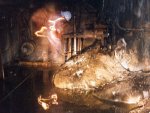If that was your point, you were completely unclear about it. Nor does your clarification actually refute what I said, especially since we are already phasing out coal; other nations need to ramp up generation; and fuel plants constantly need fuel.
By the way, the US more than doubled electricity generation using natural gas since 2002. Were you decrying the wasteful phaseout of coal plants in exchange for NG? Nope. HMMMMM.
Coal makes up 27% of US electricity generation, and higher percentages in some other nations. So yes, we should be talking about it.
Natural gas is around 37% now and growing. CO2 emissions are 50-60% lower than coal, which is good, but is obviously not as low as wind or solar. NG causes lots of environmental problems at every stage. Extraction is often toxic and harmful, and frequently involves fracking, which means pumping a variety of chemicals, often without documenting them, into the ground. NG extraction also often releases methane, which is a more potent GHG than CO2. NG needs to be transported, which requires energy and often involves pipelines which cut through sensitive environmental areas. Natural gas plants last an average of 22 years, which obviously means more waste from maintenance and/or decommissioning plants. It's better than coal, but that's not saying much.
Petroleum-based plants are less than 1% of the total, and are mostly used to fill in gaps in electrical generation.
:roll:
Stop the bull****. You don't care about birds. If you did, you'd bother to look up actual numbers of the sources of bird fatalities in the US:
Collisions with buildings: 600,000,000
Collisions with communications towers: 6,600,000
Collisions with electrical lines: 25,000,000
Collisions with vehicles: 214,000,000
Electrocutions: 5,600,000
Poison: 72,000,000
Cat: 2,400,000,000
How many birds die from colliding with wind turbines?
234,000. The number is NEGLIGIBLE compared to almost every other source of anthropic avian fatalities. Turbines are responsible for a whopping 0.007% of human-caused bird deaths.
(
U.S. Fish & Wildlife Service - Migratory Bird Program | Conserving America's Birds)
Yes, it is. That's not open to debate, any more than "cigarettes are carcinogenic."


